Foundation for Rural & Regional Renewal (FRRR)
The NSW / VIC border towns of Albury / Wodonga and surrounds were severely impacted by the cross-border lockdowns during COVID restrictions. THose who live in these adjacent communities consider them one town, yet community members were unable to cross the border unless there was an extenuating circumstance. That meant families were unable to support isolated elderly family members and those living in challenging conditions, and this was exacerbated by the devastating effects of the Black Saturday bushfires which also affected the community.
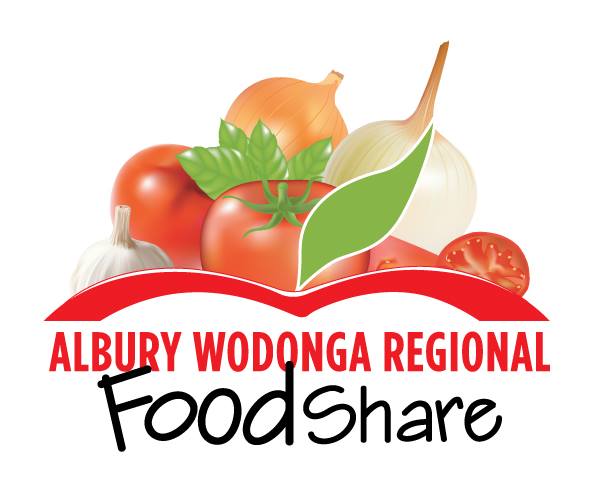
The COVID Regional Community Support program, which was funded by the New South Wales Government and delivered by FRRR, was designed to support community groups and associated volunteers that incurred expenses in delivering food and personal care items to individuals and families affected by COVID lockdowns, by contributing funds to support ongoing service provision.
One such organisation to benefit from this program with a reimbursement grant of $13,500 was Albury Wodonga Regional FoodShare, who has supported those in need in their community since 2011, and their response to the COVID-19 pandemic was remarkable.
FoodShare commenced their Community Pantry program in 2020, which enabled food hampers to be delivered directly to members of the community. To alleviate some of the hardship experienced by families in the region due to the long-term impacts of COVID and cross-border lockdowns, they also coordinated two local pop-up hamper drive-throughs in September 2021, which provided 300 families with emergency food relief.
During the peak of the COVID outbreak, 1,200 food hampers, including culturally appropriate ingredients, were distributed locally across the region. More than half of these were delivered directly to local homes as part of a coordinated COVID emergency relief effort.
To facilitate the immediate increase in demand for FoodShare’s services, operations were extended to seven days a week. This put a strain on resources, particularly on volunteers, but was necessary to keep the community safe. On average, 30 households received hampers each day, and in many instances, this doubled on occasions during the peak of the local COVID outbreak.
To provide specialised support for culturally and linguistically diverse (CALD) communities, FoodShare was supported by local organisations such as Albury-Wodonga Ethnic Communities Council (AWECC) and Murray Valley Sanctuary Refugee Group. These agencies took enquiries from CALD households who were in isolation due to the COVID outbreak. These agencies also assisted by nominating culturally specific ingredients and in some instances. their volunteers purchased additional food items and delivered these to the CALD households.
In addition to delivering hampers to local residents, FoodShare was also asked to deliver food and personal care hampers to various locations where people had been forced to isolate in accordance with Health Orders, including Rutherglen Hotels, Howlong and the Albury Caravan Park. Over 4,500 kilometres were logged from October to December last year on just one of the FoodShare vans, which was dedicated to supporting COVID operations. To support the heightened increase in demand, an additional van was also hired in November to support delivering hampers to COVID households.
This is a wonderful example of the critical role that so many local NFPs played, and the way in which they collaborated with other groups to support their community. FRRR is pleased to have been able to support this program and help the NSW Government to reimburse FoodShare for some of the costs incurred in supporting their community.
Nutrien Ag Solutions partnered with the Foundation for Rural & Regional Renewal (FRRR) to invest in meaningful community projects across Australia.
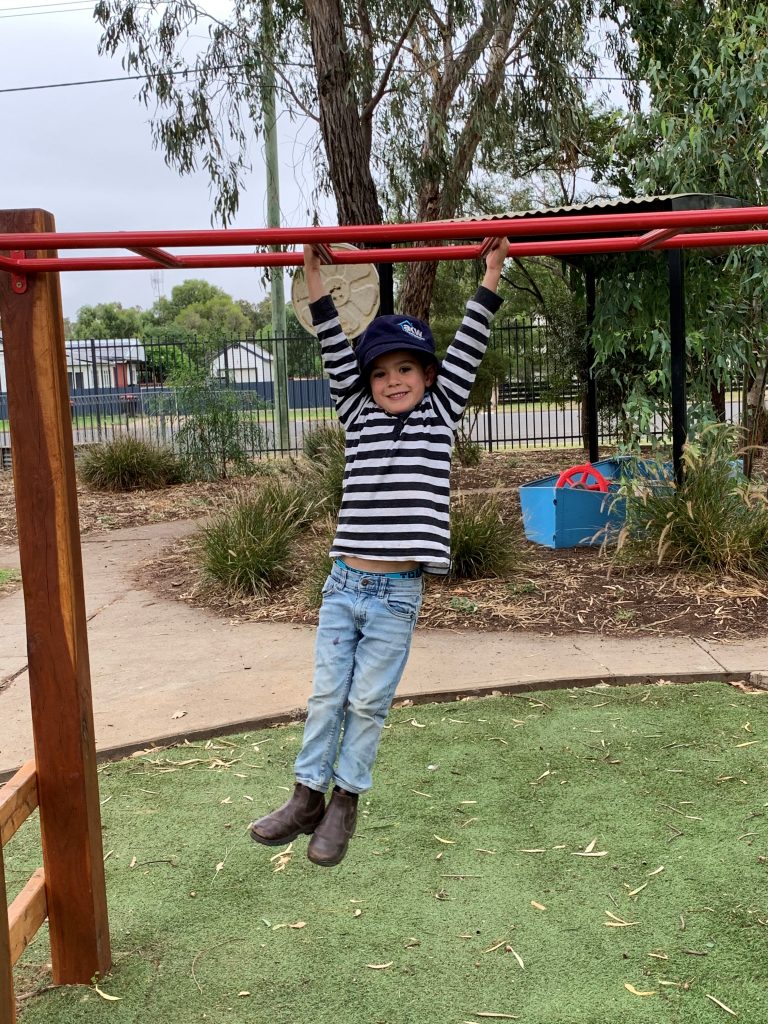
In the first round of the Nutrien Ag Solutions Community Grants Program, one recipient was Coonamble Pre School Association.
The pre-school funds and provides an occupational therapy program for local children, which involves tailored physical education programs that aim to develop motor skills critical to school readiness.
The grant was used to purchase a set of monkey bars to be utilised as part of the occupational therapy program with the aim to build children’s shoulder stability, balance, core strength and develop gross motor skills.
Speaking on behalf of the pre-school, Coonamble Pre-School President Jess Lovel described the monkey bars as being a “valued contribution to our occupational therapy program”, playing a “key role in our children’s overall development”.
“The children have been learning to swing forward and backwards, hold and swing while they tuck their legs up and propel themselves forward thus improving their hand eye coordination, building their core, leg, arm and spinal strength and improving their overall health, well-being and posture,” she said.
In an agricultural community, it is not uncommon to have a male-dominated population. However in and around Glen Innes, NSW this isn’t the case. More than half of the Glen Innes population is female. But local leadership and committee membership didn’t reflect that balance.
The Glen Innes Natural Resources Advisory Committee (GLENRAC) is dedicated to creating opportunities for land owners and the community to take an active role in managing and maintaining the natural resources of the region.
GLENRAC identified the need to improve governance skills and gender diversity within community groups and organisations to satisfy government and funding bodies.
To address this issue, GLENRAC used a $5,000 grant from FRRR’s Small Grants for Rural Communities grant program, funded in collaboration with Australia Post, to deliver a project aimed at building skills and capacity to engage with community groups in a meaningful way.
The project included three workshops over two days, targeting all members of the community and focusing on increasing knowledge of governance and leadership. During the workshops, community members engaged with experienced and professional facilitators. Participants were given the opportunity to build on their existing networks and increase their connections within the community.
GLENRAC hopes that following these workshops, women in the community will feel more confident and empowered to get involved with local committees with the skills and knowledge acquired from the events.
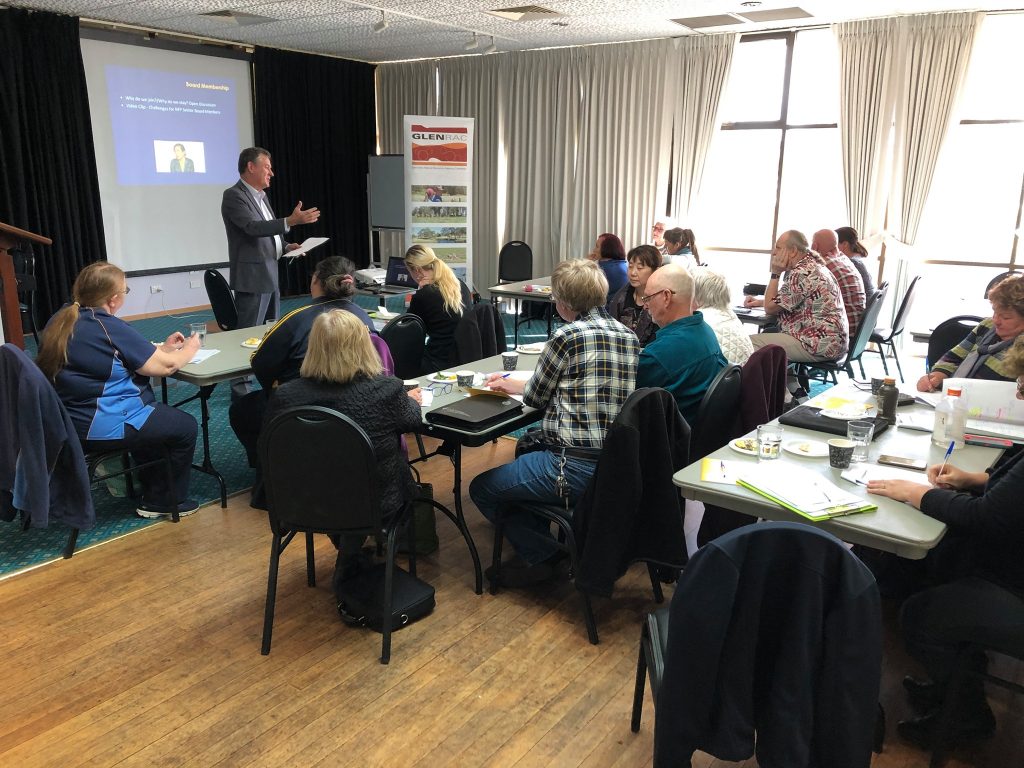
There are many elderly residents living there in aged care in the Southern Highlands in New South Wales who have limited financial support. In fact, the community-owned Harbison Memorial Retirement Village – which provides up to 50% of their residential places to residents who can’t afford to pay for their care and accommodation – receives no government funding for wellbeing, or capacity building programs.
In 2021, Harbison initiated the Grand Friends Pilot Program, an inter-generational community initiative connecting elderly residents with Kinder to Year 2 students, their families and the wider community. Partway through, the program was suspended due to COVID and a lack of funding. But the Southern Highlands Community Foundation – an organisation fostering local philanthropy to support community needs and initiatives – auspiced a grant application on behalf of Harbison, and received $20,000 through FRRR’s In a Good Place (IAGP) program to complete their pilot.
Through the generous support of CCI Giving, this IAGP grant helped restart Harbison’s pilot program, which concluded in December 2021 following a short suspension. And with benefits for both aged care residents and children alike, the program has now begun to roll out to other local schools.
The weekly program involves Kinder, Year 1 and Year 2 classes hosting their Grand Friends, with everyone participating in structured activities, conversation and a shared morning tea. In between visits, the children write letters, make cards, rock friends and complete activities to prepare for the next Grand Friends visit – Grand Friends become part of the day-to-day discussions and activities in the classroom. Residents reported reduced loneliness and incidences of depression, improved memory, mood, confidence and mobility, and an increased sense of meaning and purpose in their life.. The program also saw evidence that participating children develop empathy, social confidence and language skills.
Harbison resident, Harold Griffin, believes it is a gift to be able to visit his junior class each week.
“I get a thrill out of attending the school visit. The energy and excitement the kids have, created by our group attending their school, is wonderful,“ Harold said.
A rural NSW grantseeker is proving that philanthropic investment in people and skills can produce a huge return on investment – bringing in more than $2.4million in grants for his community.
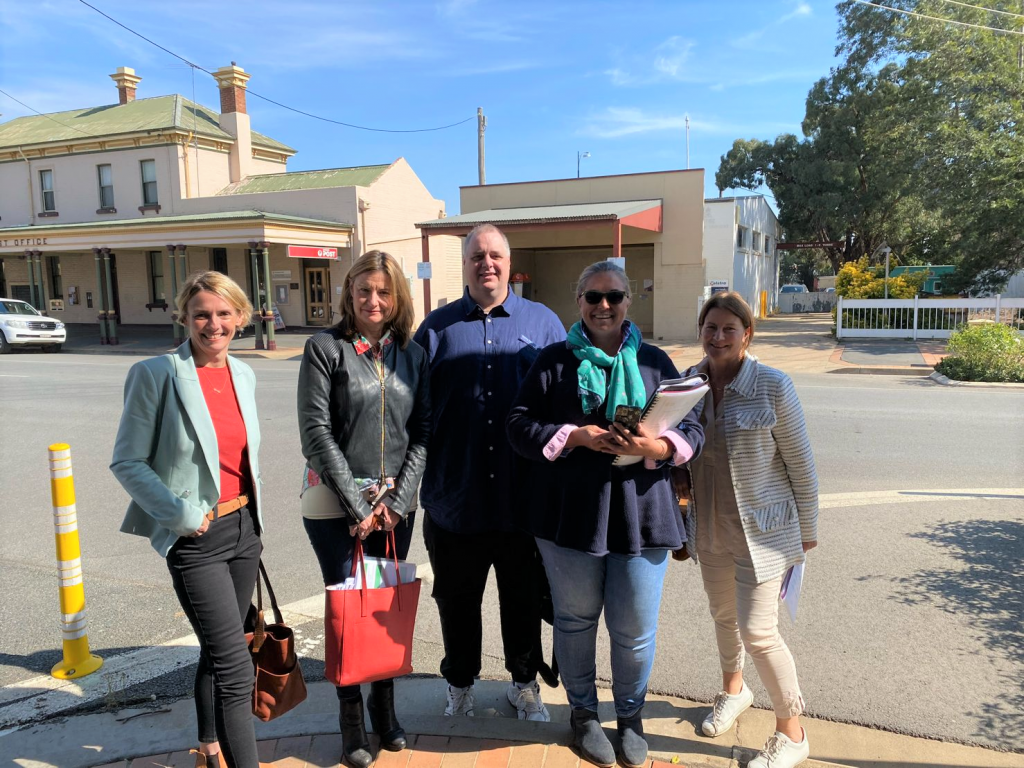
While many Government and philanthropic funders won’t give grants for funding people or capacity building, Junee Business and Trades Community Liaison Officer Nicholas Pyers is showing such investments can pay large dividends.
Nicholas’s role has been funded since 2019 by The Foundation for Rural & Regional Renewal (FRRR)’s Investing in Rural Community Futures program. He has been successful in helping win and advise on grants totalling $2,483,226 – and is awaiting news on a further $1million of grants that are in progress for Junee, which is located 440km south-west of Sydney in the Riverina region.
FRRR CEO Natalie Egleton said that since late 2018, regional NSW communities have faced a series of unrelenting disruptions, with drought, bushfire, flood and the COVID-19 pandemic continuing into 2022.
“The impact on these NFP organisations has been significant. It has taken its toll on the people that lead and run these organisations and has increased their load and affected their wellbeing. The sector has been dealing with extreme fatigue, burnout, limited fundraising options, access to volunteers, disconnection and, in some instances wholesale organisational change.
“The funding of Nicholas and the grant support role is a great example of how investing in local jobs and paying someone who has skills can result in high-yielding results and impact for organisations and communities,” she said. “This gives weight to our practise of employing local people and leveraging their position to help build the capacity of the entire town or community,” Ms Egleton said.
The impressive tally has been reached by a combination of activities. The grants have been won either by Nicholas directly developing a project concept and budget, then writing and submitting the grant application, or him reviewing other grant applications that have been submitted, as well as him identifying grant opportunities for other groups so they are able to apply. Nicholas also provides support to individuals in organisations, building their capacity and knowledge of grant writing, which allows them to prepare and submit grants, and secure funding for their own organisations.
FRRR’s Investing in Rural Community Futures (IRCF) model was developed in partnership with Vincent Fairfax Family Foundation (VFFF) and aims to strengthen local not-for-profit (NFP) organisations and, ultimately, enable them to thrive. It is a grassroots approach designed to build and support the capacity of individual and collective NFPs, over a sustained period of time.
This program now operates in seven communities in NSW, delivering a blend of grants and capacity building activities supported by local facilitators. Junee, Leeton and the Nambucca Valley were the initial cohort of communities supported by the Vincent Fairfax Family Foundation. Supported by The Snow Foundation Nowra, Ulladulla & Batemans Bay started an IRCF program in 2020 and further investment by Bendigo and Adelaide Bank’s Community Enterprise Foundation saw Bay & Basin communities join in 2021.
Successful grants for the Junee community range from upgrades to sporting facilities and meeting rooms through to projects supporting the likes of a museum.
Nine projects funded across NSW, QLD and WA
While drought is out of the media spotlight, for many communities it is still a very real and significant issue. FRRR’s Tackling Tough Times Together (TTTT) program has just awarded $86,083 to nine community initiatives in remote, rural and regional communities across Australia still dealing with the impacts of drought.
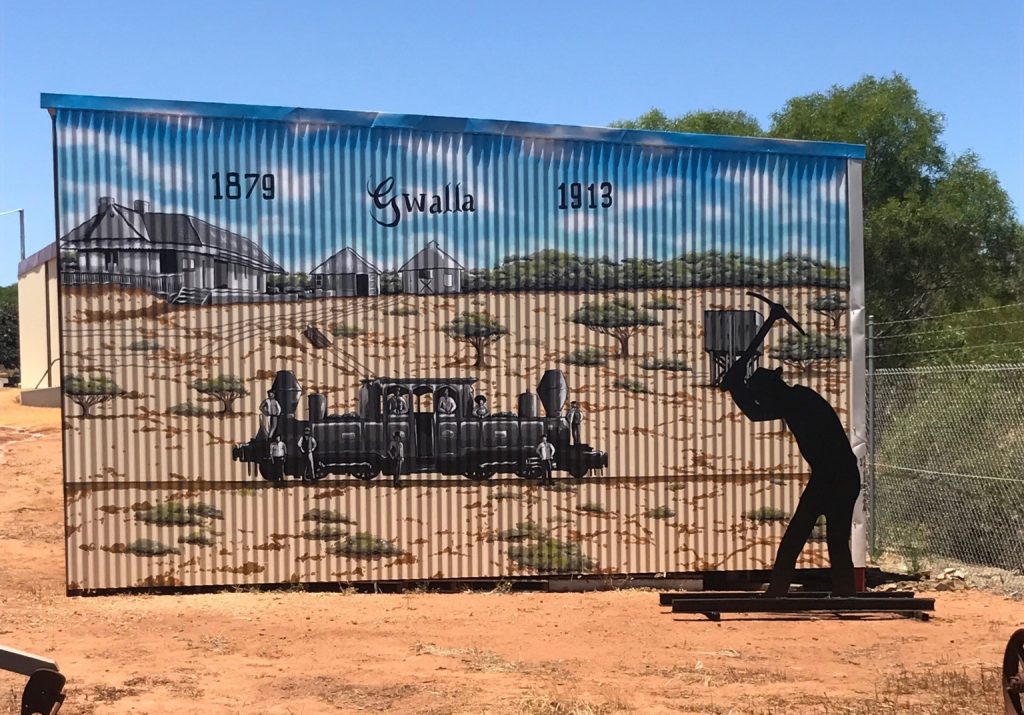
TTTT is a long-running, collaboratively-funded program that helps drought-affected communities to access the funding and resources they need to tackle the long-term impacts of drought. This round of grants will help fund a variety of projects run by local not-for-profit organisations and community groups, including a series of art workshops for both adults and children, a community event featuring Aboriginal artwork, the creation of murals and skills training to support community members experiencing loss and grief.
Nina O’Brien, FRRR’s Disaster Resilience and Recovery Lead, said that there are still many regions across Australia being impacted by drought.
“During this round of grants, the number of eligible LGAs dropped from 152 to 47. While we’re delighted to see such a significant drop in the number of communities being impacted by drought, it’s crucial that we continue to provide support. A lot of places, like remote SA, are still tackling extreme periods of dryness while others are very much still in drought recovery mode. Not to mention the fact that communities are dealing with a variety of other factors as they continue to stand strong and keep their community connected and supported.
“In this round of applications, we saw a lot of projects that are aiming to improve volunteer capacity and build a sense of social connectedness. If the last two years have taught us anything, it’s that our remote, rural and regional communities need volunteers and a strong sense of community in order to thrive.
“When we carried out our Heartbeat of Rural Australia survey last year, the results showed that the effects of drought, as well as the cumulative effects of multiple other disasters, have left volunteers feeling extremely fatigued, and those living in rural communities feeling isolated. That’s why we’re so pleased to be able to fund these kinds of grassroots initiatives at a time when they’re truly needed,” Ms O’Brien said.
Among the other projects funded this round were:
- Red Ridge Ltd – Longreach, QLD – Outback Fashion Festival – Canvas to Catwalk – Provide opportunities for Aboriginal artists from seven outback Queensland communities to participate in fashion print design workshops which culminate in a catwalk runway community event. $10,000
- Rattler Railway Company Ltd – Gympie, QLD – Fatigue Management Accommodation- Build the capacity, capability, and sustainability of Rattler Railway Company Ltd through infrastructure restoration and renovation to support volunteers. $10,000
- For a Better Chapman Valley (FABCV) Incorporated – Chapman Valley & Nabawa, WA – Winter Art Series in Chapman Valley – Facilitate social connection and enhance opportunities for the Chapman Valley community to participate in creative activities through the delivery of art workshops. $7,900
The full list of grant recipients and their projects is listed on the FRRR website.
The TTTT program supports drought-affected regions of Australia by giving community groups and local not-for-profit organisations access to the resources they need to respond to, and recover from, long-term rainfall deficiencies. This program has granted over $18 million to initiatives that are helping communities to tackle the tough times that come with drought.
Funding for this program is generously contributed by the Tim Fairfax Family Foundation, Pratt Foundation, Stockland CARE Foundation, Paul Ramsay Foundation, The Snow Foundation, Henroth Group and private donors from across the nation. To join these donors, and support grants like this through FRRR, you can make a tax-deductible donation at frrr.org.au/giving/.
The full list of grant recipients and their projects are below.
| Organisation | Project | Location | Grant | |||
|---|---|---|---|---|---|---|
| NEW SOUTH WALES | ||||||
| Moama and District Pre-School Centre Inc | Moama & District Preschool Brings Sober in the Country to Moama Improve the community’s social and emotional health and encourage local involvement by hosting a community dinner and guest speaker on drinking culture and supporting healthy choices. | Moama | $9,150 | |||
| QUEENSLAND | ||||||
| Congregation of Central Western Qld UCA | Edgely Hall Improvements Improve volunteer vitality and support social connection by installing air-conditioning in the multi-purpose room of the Longreach Uniting Church. | Longreach | $10,000 | |||
| Red Ridge (Interior Queensland) Limited | Outback Fashion Festival - Canvas to Catwalk Provide opportunities for Aboriginal artists from seven outback Queensland communities to participate in fashion print design workshops which culminate in a catwalk runway community event. | Longreach | $10,000 | |||
| Rattler Railway Company Ltd | Fatigue Management Accommodation Build the capacity, capability, and sustainability of Rattler Railway Company Ltd through infrastructure restoration and renovation to support volunteers. | Gympie | $10,000 | |||
| Kumbia & District Memorial School of Arts Inc | Kumbia & District School Memorial of Arts Inc Hall Improvements Boost and strengthen the local economy and reduce social isolation with town beautification in Kumbia through mural art. | Kumbia | $10,000 | |||
| Connecting Communities Australia Ltd | Let the Show Go On Improve volunteer vitality and support strong social connection by providing a team of volunteers to assist the Longreach Show Committee prepare and coordinate the Longreach Annual Show. | Longreach | $9,933 | |||
| WESTERN AUSTRALIA | ||||||
| The Isolated Childrens' Parents Association of (WA) Inc | 2022 ICPA Federal Conference Build communities’ resilience to continue to face the many ongoing issues and uncertainties that are inherent for families living in rural and remote Australia by hosting a conference where participants connect and learn from one another. | Various | $10,000 | |||
| Busselton Hospice Care Incorporated | Increasing the Capability to Support Grief and Bereavement in our Compassionate Community Empower a community group by providing skills training and capacity building to further support community members experiencing loss and grief. | Busselton | $9,100 | |||
| For a Better Chapman Valley (FABCV) Incorporated | Winter Art Series in Chapman Valley Facilitate social connection and enhance opportunities for the Chapman Valley community to participate in creative activities through the delivery of art workshops. | Nabawa | $7,900 | |||
Thirty-four local groups and not-for-profits that delivered food and care hampers to regional communities during the height of the 2021 COVID-19 restrictions will share in $300,000 from the NSW Government’s COVID Regional Community Support (CRCS) program.
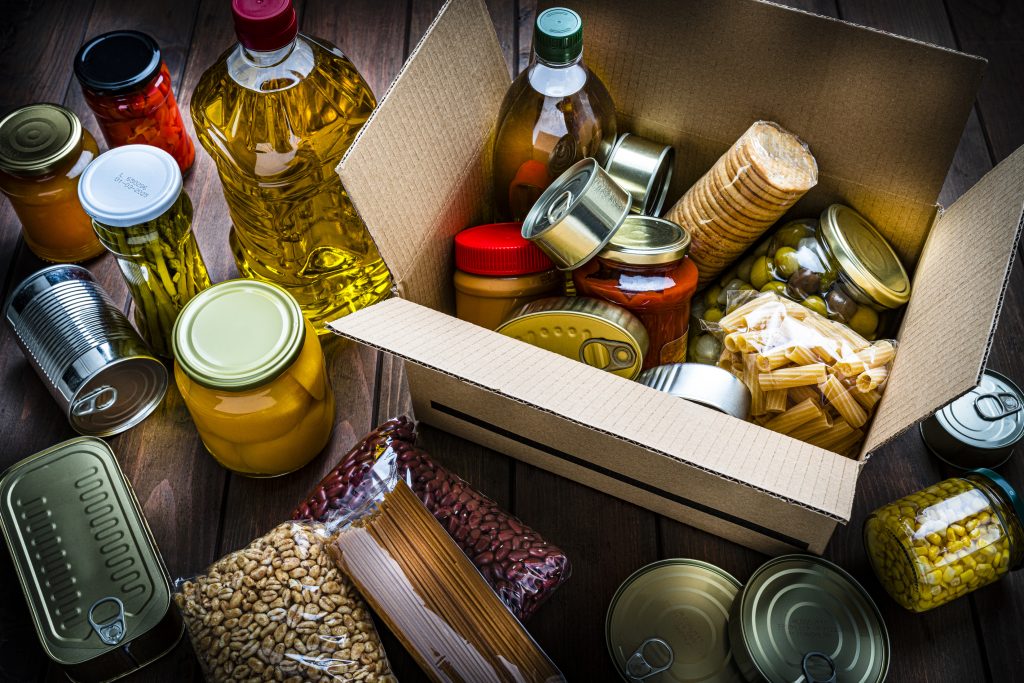
Minister for Emergency Services and Resilience and Minister for Flood Recovery Steph Cooke said more than 72,000 hampers were delivered to residents in regional and rural parts of NSW, including Ballina, Tweed Heads, Leeton and Albury.
“These groups and organisations dropped everything and dipped into their own funds to support isolated residents during last year’s COVID-19 restrictions by partnering with Resilience NSW to prepare and deliver food, essential items and relief packs to those in need,” Ms Cooke said.
“The $300,000 will cover expenses like fuel, couriers, and logistics costs, helping these groups and organisations to continue their wonderful work into the future, including at the Ballina Hot Meal Centre which is using its $5,024 grant to purchase new freezers.”
Each grant being provided through the CRCS program ranges from $1,000 to $30,000 and is administered by the Foundation for Rural & Regional Renewal.
Foundation for Rural & Regional Renewal CEO Natalie Egleton said the funding recognises the critical role that local community groups played during the pandemic.
“We’re delighted that 23 per cent of applications are from Indigenous community groups, all of which played such a vital role in ensuring that their community members were cared for, and we are pleased to be able to support them with this funding,” Ms Egleton said.
Applications are currently being accepted for grants of up to $50,000 for capacity building initiatives, such as attracting and retaining volunteers and staff, enhancing governance skills, building digital capacity and creating partnerships that foster stronger, more resilient communities.
See the full list of recipients below:
| Organisation | Locations | Grant |
|---|---|---|
| Agape Outreach Incorporated | Tweed Heads - Byron Bay | $1,681 |
| Albury Wodonga Regional Foodshare | Albury | $13,500 |
| Allambi Care Limited | Lake Maquarie - Warners Bay - Central Coast - Cessnock - Newcastle | $7,000 |
| Armidale / Uralla Meals On Wheels Incorporated | Armidale | $3,183 |
| Ballina Hot Meal Centre Incorporated | Ballina | $5,024 |
| Belong Blue Mountains Incorporated | Blue Mountains | $1,000 |
| Camden Haven Community at 3 | Lakewood | $1,125 |
| CatholicCare Social Services Hunter-Manning | Newcastle - Tareer - Forster - Maitland | $1,977 |
| Christian Outreach Centre | Kempsey - South West Rocks - Macksville - Nambucca Heads | $1,350 |
| Community Resources Limited | Wollongong | $3,540 |
| Coonamble Neighbourhood Centre | Coomamble - Gulargambone - Quambone | $10,810 |
| Food For Life Community Care Incorporated | Shoalhaven - Primbee - Wollongong - Kiama | $13,500 |
| Galambila Aboriginal Corporation | Nambucca Heads - Coffs Harbour - Woolgoolga - Bowraville | $30,000 |
| Gloucester Worimi First Peoples Aboriginal Corporation | Gloucester | $1,000 |
| Gunnedah Meals on Wheels Association | Gunnedah | $5,514 |
| Indigenous Futures Foundation Limited | Tweed Heads South - Lismore - Ballina - Grafton | $30,000 |
| Ivanhoe Central School | Ivanhoe - Balranald - Carrathool | $6,100 |
| Katungul Aboriginal Corporation Regional Health And Community Services | Batemans Bay - Narooma - Bega - Catalina - Dalmeny | $30,000 |
| Kempsey Neighbourhood Centre Inc | Kempsey | $4,500 |
| Leeton Community Care Development Incorporated | Leeton | $13,500 |
| Lions Club Of Raymond Terrace Incorporated | Raymond Terrace | $1,420 |
| Livefree Project Incorporated | Newcastle | $13,500 |
| Miyay Birray Youth Service Incorporated | Moree - Mungindi - Garah - Boomi | $18,345 |
| Moree Sports Health Arts And Education Academy Aboriginal Corporation | Moree | $5,723 |
| Orana Support Service Incorporated | Dubbo - Wellington - Narromine | $21,000 |
| Oxley Community Transport Service Incorporated | West Tamworth | $4,500 |
| Queer Family Incorporated | Mullumbimby - Byron Bay - Lismore - Kyogle | $2,250 |
| Salt Care | Ulladulla - Bomaderry - Nowra - Kangaroo Valley - Jervis Bay | $20,460 |
| Sapphire Community Projects Incorporated | Bega - Tura Beach - Bermagui - Candelo - Quaama | $4,703 |
| Seventh-Day Adventist Church - South New South Wales Conference | Bathurst - Blayney - Mandurama - Cowra | $5,600 |
| The Heartland Foundation Limited | Port Macquarie | $5,000 |
| The Mend AND Make Do Crew Incorporated | South Grafton | $6,750 |
| Uralla Neighbourhood Day Care Centre 1 | Walcha | $4,860 |
| Weilwan Local Aboriginal Land Council | Gulargambone | $1,585 |
Local community groups and not-for profit organisations in remote, rural and regional NSW are being offered grants to boost preparedness for future pandemics and other disasters.
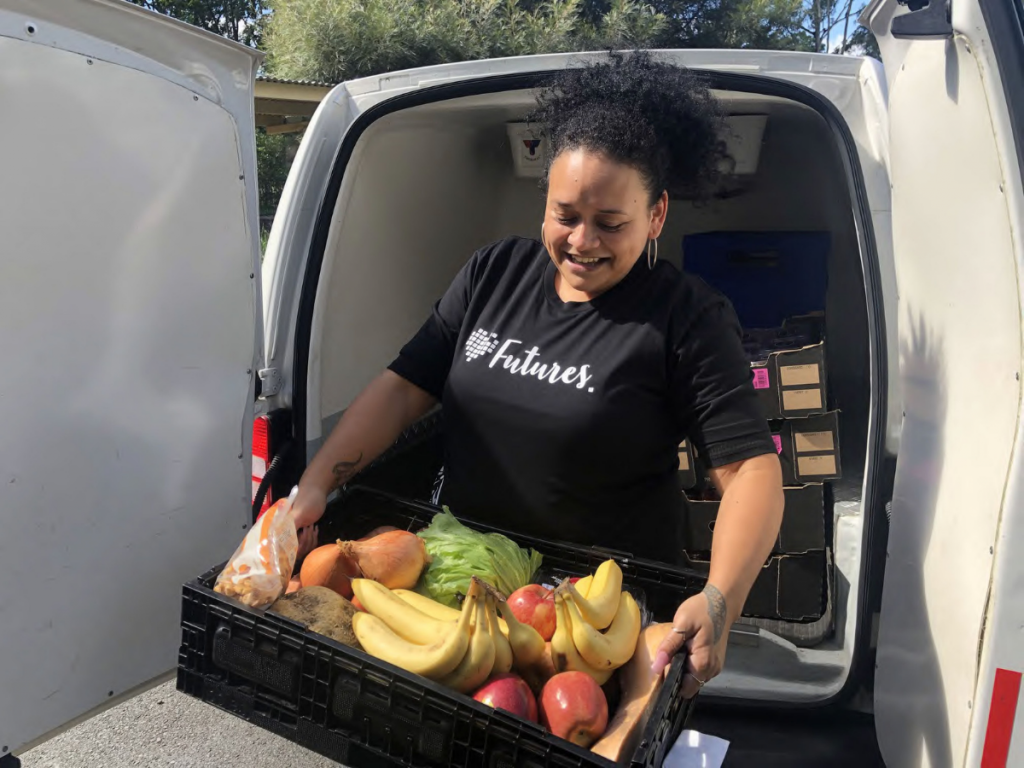
Minister for Emergency Services and Resilience and Minister for Flood Recovery Steph Cooke said the program, funded by the NSW Government, was established to strengthen groups that have played a critical role in supporting communities throughout COVID-19.
“These grants are being offered through the Resilience NSW COVID Regional Community Support (CRCS) program and are administered by the Foundation for Rural & Regional Renewal (FRRR),” Ms Cooke said.
“Grants of up to $50,000 will be awarded toward regional capacity building initiatives such as those that attract and retain volunteers and staff, train to enhance governance skills, build digital capacity and create partnerships that foster stronger, more resilient communities.”
Natalie Egleton, CEO of FRRR, said that regional organisations in NSW have gone above and beyond for their communities during the pandemic, especially when for many it was also on top of floods, fires and the mouse plague.
“Remote, rural and regional community groups and not-for-profits really stepped up in what were extraordinary times. We take our hats off to them for how they have persevered, especially in the face of so many challenges.
“The findings of our Heartbeat of Rural Australia study last year highlighted that many community groups were really fatigued and able to operate at only a fraction of their usual capacity. They were struggling to find volunteers and staff, and while many groups turned online, the digital divide that exists between urban areas and regional areas became really apparent, as did several other capacity constraints.
“This program has been designed in partnership with the NSW Government to enable community groups to address these issues and fill the gaps that became more evident during the pandemic. We know that every community is different, so it’s deliberately flexible and will support community groups to be better prepared in future,” Ms Egleton said.
To find out what can be funded through the capacity building stream, and to apply, visit https://frrr.org.au/ResNSW-Covid-Support.
Applications close 5pm AEST on Friday 29 April 2022.
Four local NFPs awarded grants
In partnership with the Bendigo Bank Community Enterprise Foundation, FRRR has awarded a further $50,293 to support four not-for-profit organisations (NFPs) in the Bay & Basin area. Bay & Basin NFPs have now received nearly $150,000 to date through the Investing in Rural Community Futures (IRCF) program, which is helping to address locally-identified priorities.
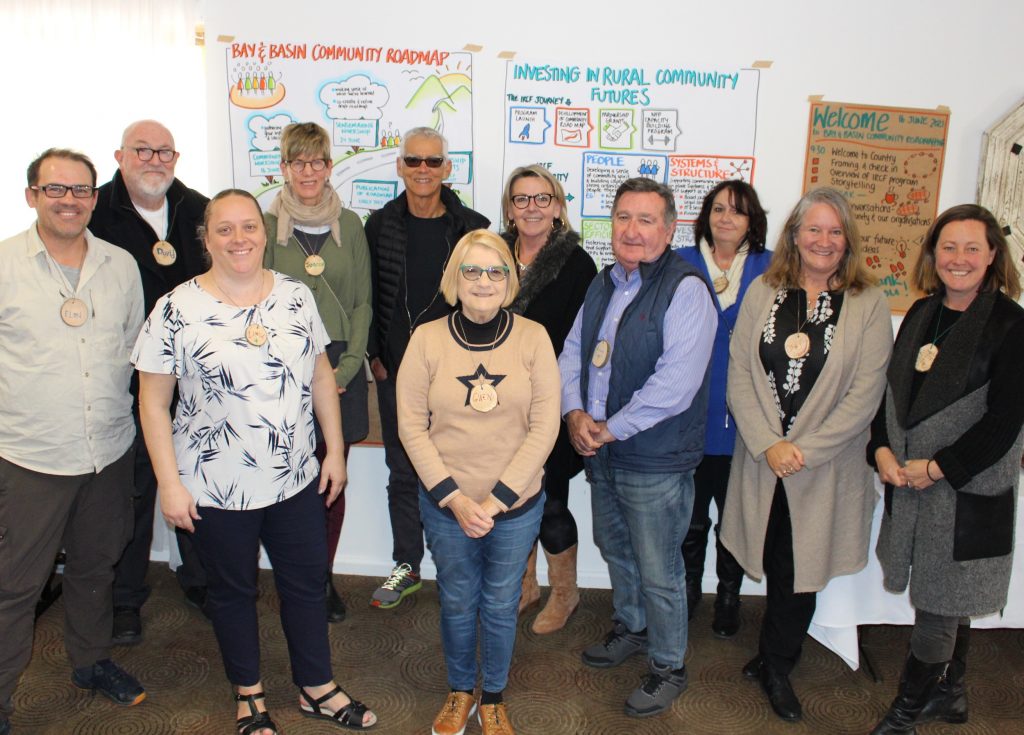
The IRCF program is a multi-year program designed to foster collaboration between local NFPs and strengthen their capacity, so they can continue to have a positive impact on the vibrancy and wellbeing of their communities. The program operates across the South Coast region, and in three other locations across NSW.
As part of the IRCF program, local leaders participated in community meetings and created a roadmap of the future opportunities they envision for their communities. This helped to identify the areas where the community groups and NFPs need support and ensures that the solutions being provided through the program are community-led.
The four funded projects cover various areas including strategy development, resilience training, equipment upgrades and human resources. One example is the Huskisson Op Shop who are engaging a paid Coordinator to support the Op Shop Volunteers, as well as a Business Advisor, who will help to modernise the Op Shop to support their food pantry in St Georges Basin.
Natalie Egleton, CEO of FRRR, said that multi-year programs, like IRCF, are vital for these remote, rural and regional communities.
“The NFPs in Bay & Basin play a big role when it comes to the quality of life for people living in these communities. Local leaders know what will work, so our role is to support them to create locally-led solutions that can be implemented over a series of years. This ensures that these communities thrive long into the future,” Ms Egleton said.
David Impey, CEO Community Enterprise Foundation, the Bendigo and Adelaide Bank’s charitable arm, said that the grant recipients are committed to developing all aspects of their organisations.
“It’s inspiring to see these people who are willing to take such a multi-faceted approach when it comes to building resilient communities. Through this program they’re developing their skills, strengthening their relationships with their peers, improving their processes and engaging in some really productive conversations.
“These organisations are powerful advocates for their communities. We’re very thankful to be able to support their efforts in creating sustainable and long-term solutions that will see the lives of everyone in Bay & Basin made that much more vibrant,” Mr Impey said.
The four projects being funded are:
- Vincentia Ratepayers and Residents Association Inc, Vincentia – Prepare, Develop, Publish and Regularly Update the Vincentia Ratepayers and Resident Association 2030 Strategic Vision Document – $7,000
- Sussex Inlet District Chamber of Commerce Incorporated, Sussex Inlet – Sussex Inlet, a Vibrant Future- Building the capacity of our communitythrough resilience training and by developing a marketing campaign – $3,900
- Sanctuary Point Community Pride Incorporated, Sanctuary Point – Boosting Pride by fostering community engagement and enhancing organisational capacity through the development of a website, communications strategy, and accounting software – $10,309
- UCA – Bay & Basin, St Georges Basin – Growing the Husky Op-shop by building organisational capacity to enable a stable of aligned social enterprises – $29,084.
In addition to Bay & Basin, the IRCF South Coast program is also working in Nowra, Batemans Bay and Ulladulla, with the support of The Snow Foundation and in Junee, Leeton and Nambucca Valley in partnership with the Vincent Fairfax Family Foundation.
For more information about the Investing in Rural Community Futures program visit – https://frrr.org.au/ircf-program/.
And support from new IRCF Program Manager and facilitator
Seven not-for-profit organisations (NFPs) are sharing in $135,471 for projects that will strengthen the NFP sector and inter-organisational relationships in Nowra, helping the community to thrive and achieve long-term stability. Nowra NFPs will also have on-the-ground support from a new South Coast Program Manager and local facilitator.
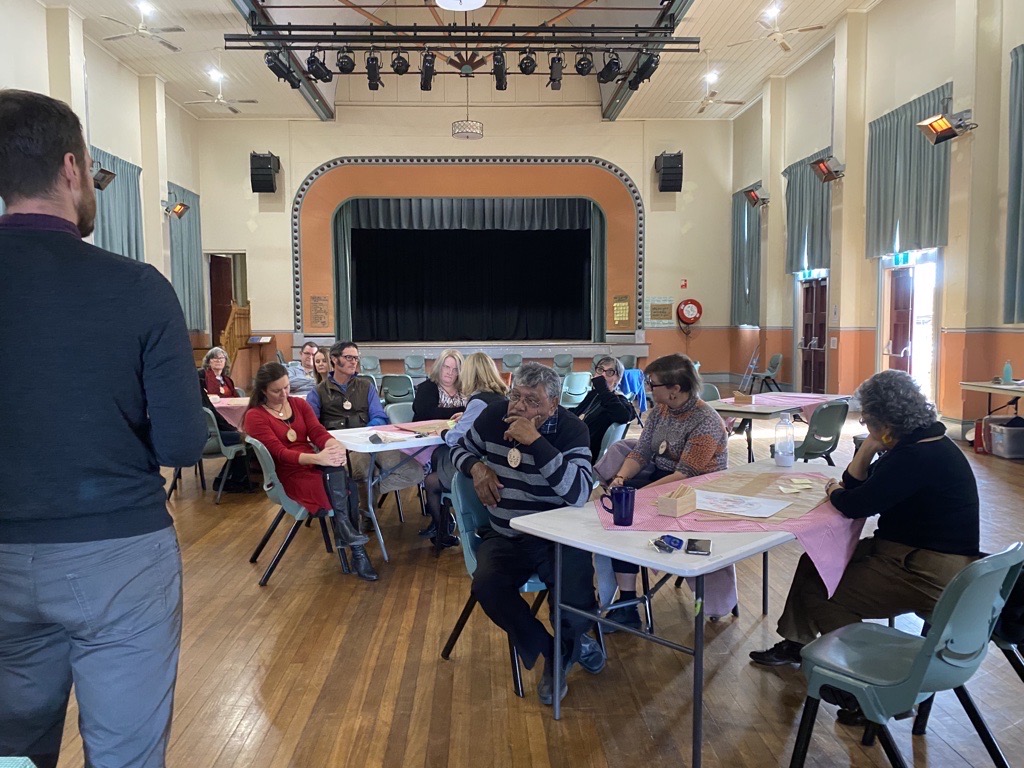
Funded through FRRR’s Investing in Rural Community Futures (IRCF) program, in partnership with The Snow Foundation, these grants will allow Nowra NFPs to properly develop the tools, resources and skills they need to achieve longevity and create permanent change in their communities.
IRCF is a multi-year grassroots program aimed at building the capacity and connectedness of NFPs in select communities in regional New South Wales. As well as grants, these recipients will receive organisational support and coordination in the form of workshops that will help them to implement more effective systems, processes and training within their organisations.
Among the seven projects funded, there is a focus on developing leadership and business skills, technological transformation, cultural immersion and community engagement. These projects address needs highlighted through a community-led Roadmap, the development of which was facilitated by FRRR.
Natalie Egleton, CEO of FRRR, said that these initiatives will have a lasting impact on the people of Nowra.
“It’s fantastic to see the not-for-profit organisations in this round of grants collaborating and learning from their peers, and successfully applying that knowledge to the unique needs and circumstances of their own communities.
“It’s wonderful to see local organisations prioritising community engagement and creating safe cultural spaces. This includes the South Coast Women’s Health & Welfare Aboriginal Corporation, which is using their funding to deliver cultural immersion sessions to 30 Nowra NFP representatives in response to vision identified in the Nowra Community Roadmap,” Ms Egleton said.
Terry Snow, Founder of The Snow Foundation, said partnering with FRRR has allowed his Foundation to have a significant impact on regional NSW areas such as Nowra.
“Having a home and running a business on the South Coast, I understand how important it is to support these not-for-profit organisations. They provide crucial support and fill gaps that help to keep these communities vibrant and self-sufficient. With the resources provided by this program, these organisations will create real change.
“A great example of this is the Nowra Community Food Store, which is using their grant to set up an E-commerce website with an option for contactless delivery, so that families in the Shoalhaven region who don’t own a car can still access fresh food.”
The five other grant recipients in the Nowra region are:
- Cullunghutti Aboriginal Child and Family Centre Aboriginal Corporation, Nowra – Laying the Foundations for the Future of Cullunghutti Aboriginal Child and Family Centre Aboriginal Corporation – Support the Centre’s future vision and rapid growth by appointing a temporary Community Centre Team Leader to support the CEO in an operational capacity. $30,000
- Nowra Sub-Branch of the Returned and Services League of Australia New South Wales Branch, Nowra – Nowra RSL Sub-Branch Upgrade Project 2021 – Accelerate digital transformation and enhance client experience through upgrades to IT equipment and furniture. $16,469
- Shoalhaven Community Preschool Inc, Nowra – The Growth Strategy Project – Strengthen the leadership capacity of the Centre during the Preschool’s relocation and expansion by providing a wage subsidy, expert consultants and professional development. $22,000
- Shoalhaven Health and Arts Inc, Bomaderry – Capacity Building for SHAA’s Future – Strengthen the capacity of SHAA to respond to community demand for their mental health, arts and events programs by paying wages for the currently volunteer-based managers. $14,112
- South Coast Beef Producers Association Inc, Nowra – Governance Training for South Coast Beef Management Committee Members – Strengthen the governance and strategic vision of South Coast Beef through the training of the management committee in governance foundations. $10,590
New IRCF Program Manager – South Coast and Nowra facilitator
Helping Nowra’s NFPs to make the most of the IRCF program is IRCF South Coast’s recently appointed Program Manager, and South Coast local, Carolyn Ardler.
Carolyn comes to FRRR and the IRCF program with extensive experience in place-based delivery to support communities to build capacity and reach their aspirations from the grassroots.
“I am excited to be working on the IRCF program as I strongly believe rural and regional communities have the solutions and strength within them to face their unique challenges. This program allows small not for profits to build their capacity and be more sustainable in the long term.” Ms Ardler said.
Carolyn steps into her new position as Kate Dezarnaulds, FRRR’s previous Program Manager for IRCF South Coast, transitions into the role of IRCF facilitator for Nowra. In this role, Kate will be able to work more directly with Nowra NFPs to connect, build relationships and work together to improve their capacity and sustainability.
In addition to Nowra, the IRCF South Coast program is also working in Batemans Bay and Ulladulla with the support of The Snow Foundation, and in Bay & Basin with the support of Bendigo Bank Community Enterprise Foundation, and in Junee, Leeton and Nambucca Valley in partnership with the Vincent Fairfax Family Foundation.
For more information about the Investing in Rural Community Futures program visit – https://frrr.org.au/ircf-program/.

